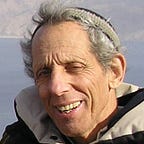Why Are Millions of Jews Fasting over an Ancient Ruin?
Everyone can learn something from Jews’ mourning the destruction of a 2,500-year-old building used for sacrificing animals.
Jews began an annual 24-hour fast Saturday night and Sunday to commemorate the destruction of the First and Second Holy Temples where Israelites brought animals for sacrifice.
It seems unimaginable. People find enough excuses to hate Jews, so why should they be mourning over the inability to display animal cruelty to the whole world?
Seemingly even worse, Jews pray every day for the construction of a Third Temple where sacrificial rites might have to be carried out.
Who needs it?
The annual fast day falls on the ninth day of the Hebrew month of Av, when the Babylonians burned to the ground the First Temple 2,500 years ago and the Romans followed suit more than 650 years later by destroying the Second Temple.
That is only half the picture.
The spirituality at the beginning of the First Temple, the ensuing arrogance, brotherly hate and lust, and the need for a symbol of hope provide lessons for everybody, regardless of religion and even if they are atheists.
Let’s start with the reign of King Solomon, crowned as the “wisest of all men.” He fulfilled his father King David’s vision to build a structure where God would dwell as Jews atoned for their sins and celebrated their prosperity by bringing animals for sacrifice.
Today it seem cruel, but in those days it was a lot better than sacrificing humans, which was the practice of many idol worshippers.
The Talmud teaches that the Divine Presence dwelled in the First Temple. Solomon’s kingdom was powerful and prosperous - until everything started going downhill.
King Solomon’s wisdom got the best of him. He violated the direct Biblical command that a king “shall not take many wives for himself, and his heart must not turn away, and he shall not acquire much silver and gold for himself [Deuteronomy 17:17].
How many wives is “many”? The Old Testament relates that he had 700 wives and 300 concubines [Kings 1, 11:4], much more than one too many. King Solomon added sin to sin by marrying idol worshippers, including the daughter of the Egyptian Pharaoh. He seems he never had enough.
He allowed idol worship in the very same Temple where there was a Divine Presence. For centuries, every king was certain that the Holy Temple was indestructible because it was the House of God. But it wasn’t anymore.
Does any of this sound familiar?
How many corporations, heads of state, rock stars, super athletes and families collapse because they “knew” they achieved success by themselves, as if no one on Earth let alone God had helped them?
There is another lesson in this story.
On this fast day, Jews recall the cruelty of the enemies but they don’t blame them. The Talmud teaches that the First Temple fell because of bloodshed among Jews, illicit relationships and idol worship.
It also reveals that the Second Temple fell because of “senseless hate,” meaning man is his own worst enemy. Pogo cartoonist Walt Kelly explained it when he wrote in an anti-pollution Earth Day poster in 1970, “We have met the enemy and he is us.”
Sound familiar? Who takes responsibility for his own problems today? And who simply blames someone else?
The third lesson is buried beneath the Jews’ expressed wish for a Third Temple. You can forget about the idea of sacrificing animals again, because some rabbis have taught that there will be no need for sacrificial rites in the Third Temple.
So what’s the point?
The prayers for a Third Temple, where there will be a world of peace, is not going to happen just by reciting words, paying a contractor or signing peace agreements and then ignoring them.
It is something that has to be believed forever and is something that will happen only if everyone succeeds in avoiding the pitfalls of King Solomon.
And that is why so many Jews are fasting on the anniversary of the destruction of the Temples.
